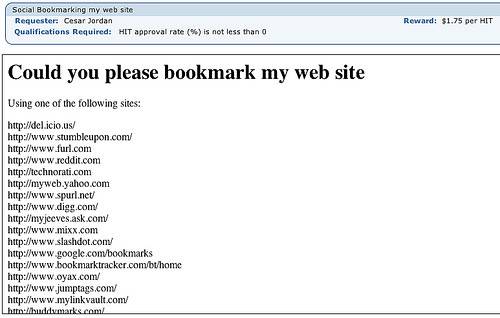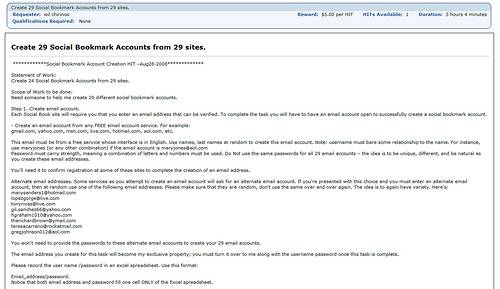Amazon’s Mechanical Turk has fallen prey to social media spammers and it is now full of requests to spam bookmarking services for pennies per link. Although these HITs may stop short of being “fraud” in the legal sense of the word, they are certainly dishonest and unsavory. In addition to these spam bookmarking requests, we’re also seeing HITs for Diggs, Stumbles, Slashdots, etc. of spammers’ web pages and web sites.

In case you’re unfamiliar, Amazon’s Mechanical Turk is a crowdsourced marketplace for tasks. A person needing work done can set up a HIT (human intelligence task) – the small job they need done. Others come along to perform the HITs, earning micro payments along the way. In this way, businesses, developers, and other individuals have access to an affordable, scalable workforce
The Dark Side to Mechanical Turk
Unfortunately, it appears that the convenience of the Turk marketplace has some appeal to social media spammers, who are now using the site to earn Diggs, bookmarks, and other social recommendations they do not deserve. Here’s an example:

Photo courtesy of Brynn Evans
Anyone who uses Amazon’s Mechanical Turk has no doubt come across similar HITs posted by spammers. For example, this guy is requesting someone create 29 social bookmark accounts from 29 sites:

A search for “bookmark” on MT today displays 48 results (at the time of writing) where spammers are requesting social bookmarking of their web site. Search for “digg” and you’ll find people paying for Diggs.
Of course, whenever there is a system in place (like social media) that can help drive traffic to a web site, there will be those people who use it to generate traffic for their spam sites. But why are they able to use Amazon Mechanical Turk to do so? Shouldn’t Amazon police the Turk to shut down these spam accounts?
Mechanical Turk Still Has Promise, Despite Spammers
However, this doesn’t mean that Mechanical Turk doesn’t hold any value – it’s still an innovative and useful tool for many. In fact, members of the HCI community (Human Computer Interaction) have begun to use Turk for userresearch studies with great success. This work has inspired others like open source advocate, Chris Messina, to do the same. He plans to use Turk for usability studies on OpenID and OAuth. Since the HITs are spread out among many, the cost of performing these studies is greatly reduced. Being able to crowdsource research is a great way that MT can be used today, and one that will have a big impact on the future, too.
Thanks to Brynn Evans, a graduate student in the Department of Cognitive Science at University of California, San Diego for discovering this and thanks to open source advocate Chris Messina for sending it along to us.

















